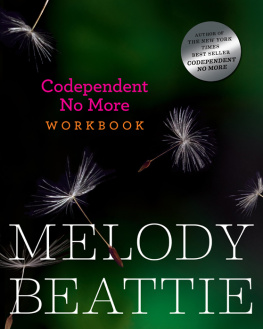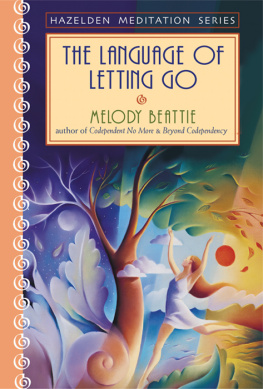
The
Grief Club
The
Grief Club
The Secret to Getting Through All Kinds of Change
MELODY BEATTIE

Hazelden Publishing
Center City, Minnesota 55012-0176
800-328-9000
hazelden.org/bookstore
2006 by Melody Beattie
All rights reserved. Published 2006
Printed in the United States of America
No portion of this publication may be reproduced in any manner
without the written permission of the publisher
ISBN-13: 978-1-59285-349-6
ISBN-10: 1-59285-349-8
Ebook ISBN: 978-1-59285-782-1
Editor's note
This book includes the author's personal accounts of dealing with loss and grief, as well as others' true stories. All personal stories that appear in this book have been used with permission. In some cases, names, dates, and circumstances have been changed to protect anonymity, but many individuals have requested that their real names be used.
This book is for educational purposes. It is not intended to replace medical advice. This publication is intended to provide authoritative and accurate information, and it is up-to-date and timely as of its date of publication; however, it is not meant to replace the services of a trained professional, physician, support group, or recovery group. This book is sold with the understanding that the publisher and author are not rendering individual psychological or medical services, or individual services of any kind, to the reader. Should such services be necessary, please consult an appropriate professional.
10 09 08 07 06 6 5 4 3 2 1
Cover design by David Spohn
Interior design by David Spohn
Typesetting by Tursso Companies
This book is for Us.
Contents
Acknowledgments
For your help, support, and guidance I acknowledge and thank:
God; Shane, Nichole, Michael, and the boys (Julian and Maceo); Michael Bodine (for continually keeping me in contact with the True Storytellers); John, Jeanette, and family (Brandon and Courtney); Jeanne, Bob, and family; brother Jimmy, Pam, and family; Mom, Dad, Joanne, and all the family and ancestors including Great-Grandma Annie; David Zempel and Patty (thanks for being back in my life); Dr. Forest Tennant (for making normal life possible); Dr. Hank Golden, whose dedication to healing has brought me back one more time; Dr. Randy Harris; Dr. Willem Zeegers and the Alpha Klink (for a new spine); Dr. William O'Brien and Dr. Ron Benbassot; Lloyd Wright; Christopher Pierce; Mark Mintzer and Global Patient Network; Isaac Shachory; Faith Heinemann (for generously sharing her experience); Becky (for the patience of several saints); Lori Yearwood (for research and her story) and her dad, Vernon; Andy Delk; Howard Wills; Stephanie and family; Ginny and Chuck Miller; May; Tom Greenly; Kate Somerville; David Beattie; Steve and Scott; Peg; all the people who anonymously shared their stories with meyou know who you are, and I am deeply grateful for your generosity; Dr. Frank Ryan (lots of docs keeping this body going); Marcie New and Josh; Stacey Peasley and her dad, John; Dr. Jennifer Schneider; Ruth Andersonmy first counselor who believed there was a human being underneath the addictions when nobody else in the world did; the judge who had enough sense to send me to treatment in 1973; Lorraine and Pat (Gramps) Teel; Chuck Beattie and Allison; Dan Cain, R. S. Eden, the old Eden House, and the Board of Directors; Hazelden staff; Sonja Ray; Sharon Koukkarin, M.S.L.P.; Steph and God's Remedy; Bradley Quick; Cindy, Sharon, and Ericawho keep my life intact when I crawl in a cave and write; C. J.; all the Twelve Step programs, because when I needed help I didn't have any money, and they're free; and all the seen and unseen angels in my life. Many of you are living people. If I've overlooked or forgotten anyone, know you're not forgotten in my heartnothing is accomplished alone. I deliberately left out the names of many people to protect their anonymity. You know who you are and how much I love and respect you.

INTRODUCTION
Welcome to the Club
T he doctors walk into the room, a room quiet except for the whooshing sound coming from the machines forcing air into my twelve-year-old son's lungs. It's an illusion, a doctor says. He's not alive. His brain died days ago. Your son is gone.
There's hope, I say.
No, there isn't, the doctors say back.
You're wrong, I think. There's always hopeisn't there? At least there was until now.
You've got until one o'clock this morning to say your good-byes, another doctor, a woman, says. Then we're shutting down the machines.
Conversation over. No options are offered to me. I go into the family room created for the people doing vigil with my daughter, my ex-husband, and me. I pick up the Bible. I'll read where the pages open, I think. I'll get a sign. I've gotten messages that way before. The pages fall open in my hands. I read under my thumb. It's the story of how Jesus brings Lazarus back from the dead. Even if I won't admit it, I know the truth. This isn't a sign. It might mean something, but I don't know what it is.
I go back into the intensive-care room. People filter in to tell Shane good-bye. When they finish, I hold Shane in my arms. He's covered with bandages, hooked up to tubes. A nurse turns off the machines. The whooshing noise stops. I hear one faint sound. It's Shane exhaling his last breath. A nurse rests her hand on my shoulder. It's going to take a long time. Eight years at least, she said. It's going to be hard, but you'll get through it. I know. My daughter died when she was nine.
All I can think is, I don't want to be like herhave a dead child. I don't want to go through this. Somebody made a mistake.
It takes years to understand the meaning of that brief conversation: I had been welcomed to the club.
It wasn't the first club I unwillingly joined.
The man is tall, gaunt with a long, thin face. He used to drink too much. That's why his wife left, he lost his job, his car broke down, and his dog bit him. Then he joined AA (Alcoholics Anonymous). When he stopped drinking, his wife came home, he found a different job, bought a new car. His dog stopped biting him and licked his hand instead. With all the differences between this gaunt man and me, the first time I heard him tell his story, I found something we had in common. He never liked himself, didn't feel like he belonged. That's why he started drinking too muchalcohol eased the pain of being alive. Then his buddy alcohol turned on him. It destroyed his life. When he tried to quit drinking, he couldn't stop. The AA program and a Higher Power did for him what he couldn't do for himself. Now he stands by the door when I walk into the sparsely furnished roomtwenty metal folding chairs piled around three chipped Formica tables. Welcome, he says. I'm glad you're here.
I'm not glad I'm there, but I don't have anywhere else to go. The gratitude comes later, when the program changes my life.
Fast-forward eight years. I walk into another room. This one is filled mostly with women. I see only two men. A long table is spread with cookies, lemon bars, steaming pots of coffee, hot water for tea. A perky woman runs up to me. Welcome to Al-Anon, she says. I step backward.
Next page
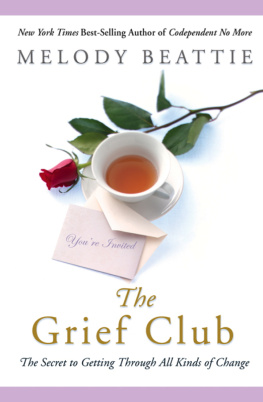
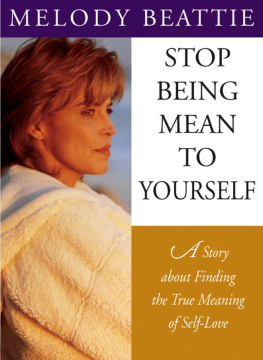
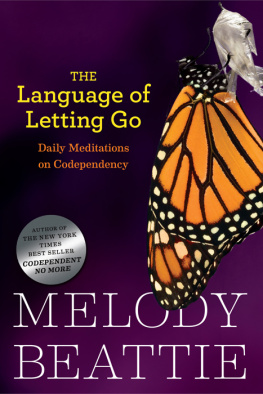
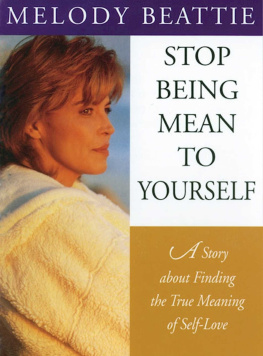
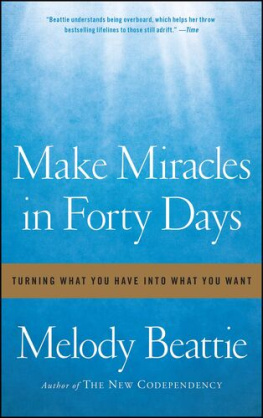
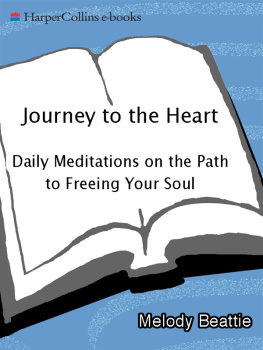
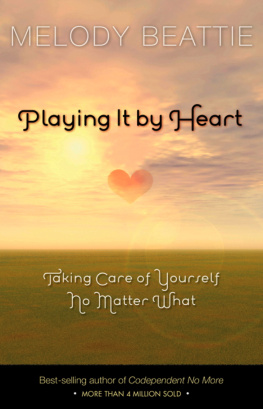
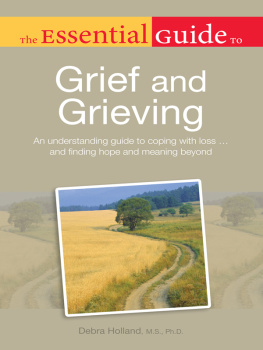
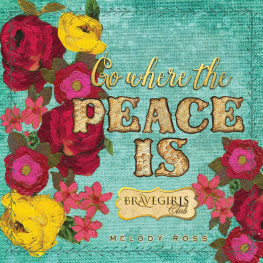
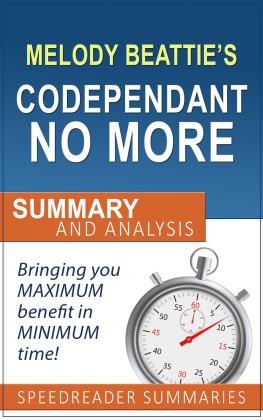
![Beattie - Melody Beattie bundle: [a collection of four Melody Beattie best sellers]](/uploads/posts/book/249274/thumbs/beattie-melody-beattie-bundle-a-collection-of.jpg)
